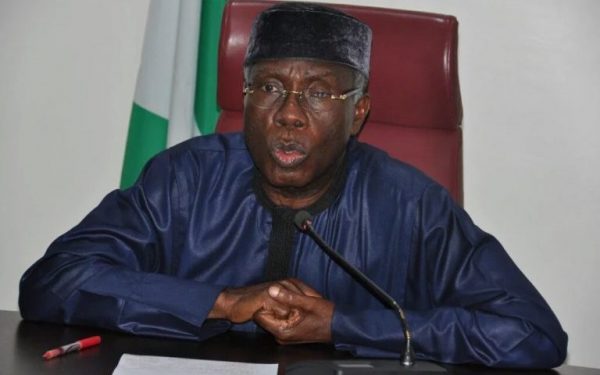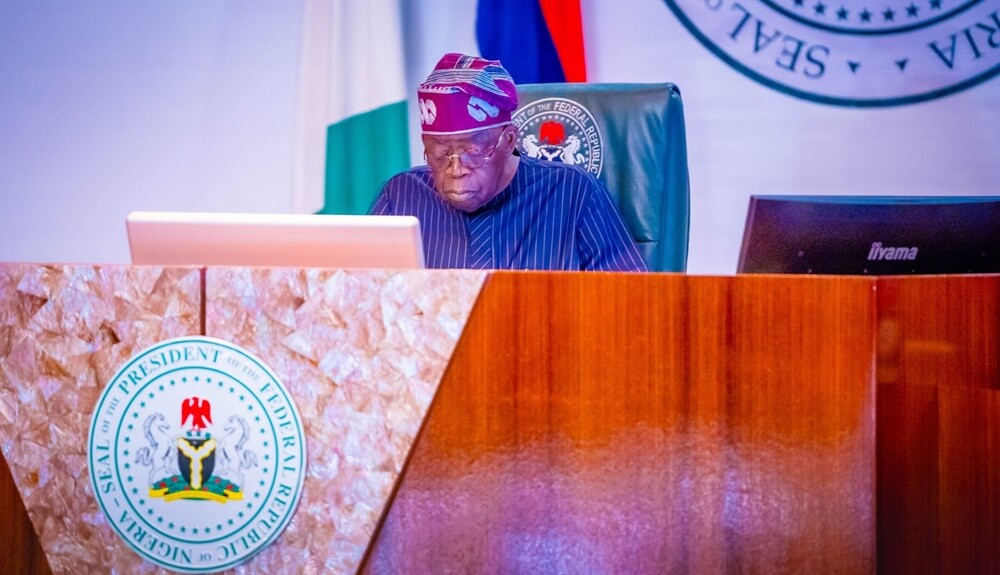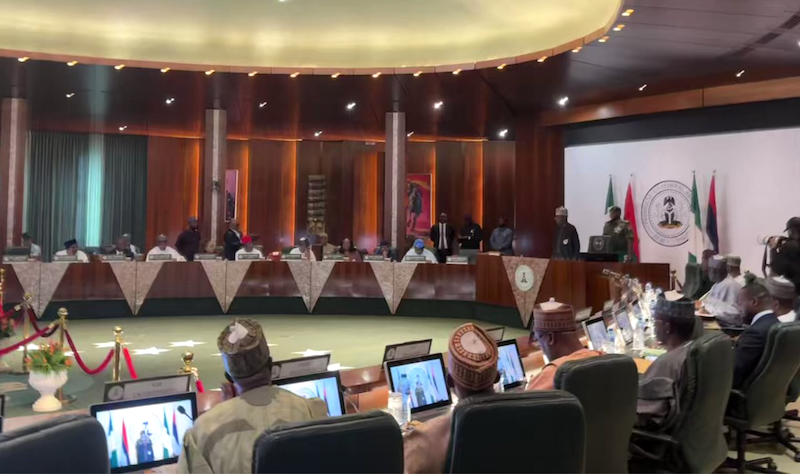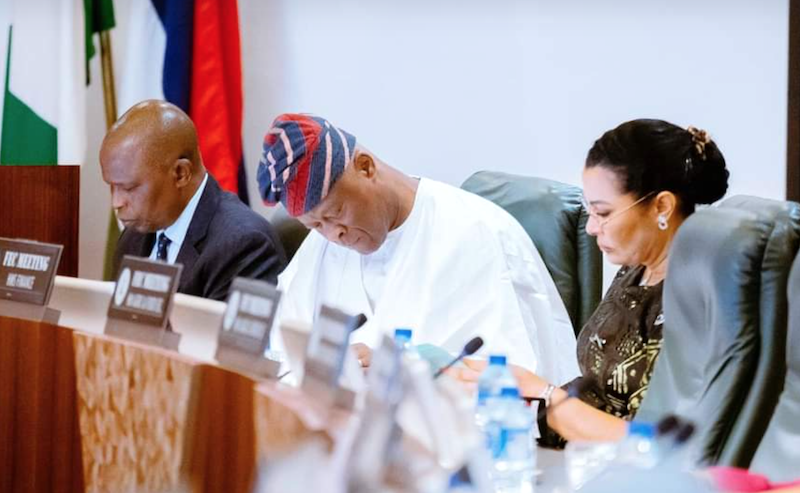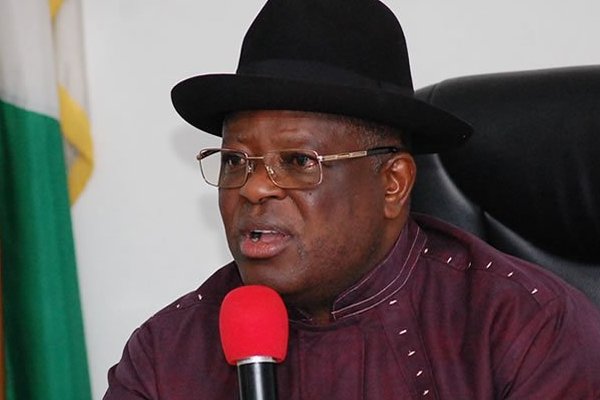The Federal Executive Council (FEC) has expressed sadness over the passing of a former Minister of Agriculture, Chief Audu Ogbeh, at the age of 78.
The Secretary to the Government of the Federation (SGF), Sen. George Akume, said this in a statement issued by Segun Imohiosen Director, Information and Public Relations in his office in Abuja.
FEC, according to Akume, described Ogbeh’s death as a great loss to the nation.
Akume said the deceased served Nigeria in various capacities, including as Minister of Communications in the Second Republic and later as Minister of Agriculture under former President Muhammadu Buhari.
He said Ogbeh’s passing was also a personal loss, noting that they shared a bond rooted in their Benue heritage and commitment to national service.
The SGF recalled that Ogbeh joined politics in the 1970s as a legislator and remained steadfast in championing national unity and development.
He condoled with the government and people of Benue, the deceased’s family, friends and political associates, praying for the repose of his soul.
Ogbeh was a patriot, principled politician – Atiku
Meanwhile, the former Vice President, Atiku Abubakar, has described the death of the former Agriculture Minister and nationalist, Chief Audu Ogbeh, as a “loss of a patriot and principled politician”.
Abubakar, in a statement by his Media Office on Saturday in Abuja, described Ogbeh as a “quintessential gentleman, affable and amiable friend and reliable political ally”, whose immense contributions to nation-building would be sorely missed.
Abubakar recalled that Ogbeh’s chairmanship of the Peoples Democratic Party (PDP) from 2001-2005, was impactful.
He described the multi-linguist, farmer, politician, as also a renowned family man, an Idoma community steward, and a great ambassador of Nigeria globally.
“He was a detribalized and development-minded politician. One who combined intellectualism with pragmatism. He was also a true defender of liberal democracy. His type is difficult to replace.
Abubakar commiserated with the family, friends, the people of Benue, and Nigerians at large.
He prayed that the Almighty would blissfully rest his soul and comfort his nuclear family, friends, and political associates. Chief Ogbeh died in his Abuja residence on Saturday morning at the age of 78.
Jonathan hails Ogbeh’s patriotism, humility
Similarly, former President Goodluck Jonathan has expressed sadness over the death of former PDP National Chairman, Chief Audu Ogbeh, describing his life as defined by patriotism and humility.
In a condolence message issued by his Media Adviser, Ikechukwu Eze, on Saturday in Abuja, Jonathan described Ogbeh as a distinguished public servant and respected elder statesman.
He hailed the late former Minister of Agriculture for decades of meritorious service to Nigeria.
“Ogbeh’s life was defined by patriotism, humility and a steadfast commitment to national unity and development.
“In his various roles, including as teacher, minister and PDP national chairman, he displayed uncommon patriotism, intellect and unwavering commitment to unity, democracy and national development,” Jonathan said.
The former president lauded Ogbeh’s contributions to agriculture and democratic governance, describing them as a lasting legacy that will inspire future generations.
Jonathan extended condolences to Ogbeh’s wife, children, the entire Ogbeh family of Otukpo, and the government and people of Benue.
He also expressed solidarity with all Nigerians mourning the late politician.
“My thoughts and prayers are with his family, the people of Benue and all Nigerians who mourn him. May God grant his gentle soul eternal rest and comfort all who are bereaved,” he prayed.
Ogbeh, a veteran politician, farmer and elder statesman, was widely respected for his integrity, intellect and dedication to public service.
He served in several key political roles, leaving an indelible mark on Nigeria’s political and agricultural landscape.
Akpabio mourns Ogbeh
Also, President of the Senate, Godswill Akpabio, has expressed sadness over the passing of Chief Audu Ogbeh, former Minister of Agriculture and Rural Development.
Ogbeh served during late President Muhammadu Buhari’s first term.
In a statement on Saturday, through his Special Adviser on Media and Publicity, Eseme Eyiboh, Akpabio described Ogbeh as a distinguished Nigerian of service and integrity.
“It is with great sadness that I received news of the passing of Chief Audu Ogbeh, a distinguished elder statesman and dedicated public servant.
“Ogbeh lived a life of service, integrity, and commitment to the development of our nation.
“As a two-time minister under different administrations, and former Peoples Democratic Party (PDP) chairman, his contributions to agriculture, rural development, and nation-building will be long remembered.
“Ogbeh was an intellectual storehouse, whose legacy of service and dedication to Nigeria testifies to his character and commitment to public service. We will sorely miss him.
“On behalf of my family, constituents, and the 10th Senate, I extend deepest condolences to the family of Chief Audu Ogbeh.
“To his friends, political associates, the people and government of Benue, and our great party, the All Progressives Congress (APC).
“I pray that Almighty God grants the family fortitude to bear this painful loss, and may his soul find eternal favour with God,” Akpabio said.
